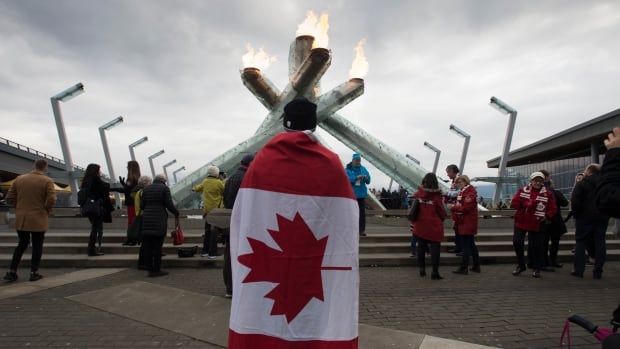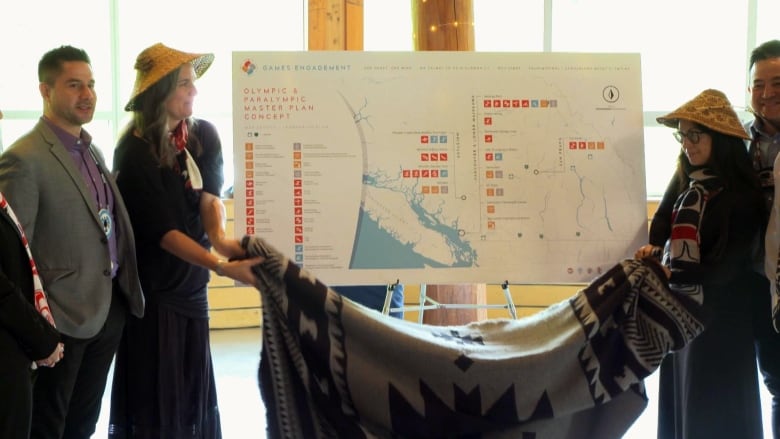
After more than a year of sitting on the sidelines, the B.C. government entered the Olympics debate — and promptly ended it.
“I just think it’s the wrong time,” said Lisa Beare, the minister of tourism, arts and culture, as she announced the province would not be supporting a bid for the 2030 Winter Olympics.
“The government has a lot to focus on. It is an extraordinary expense for the people of British Columbia.”
The announcement doesn’t officially end the bid, which had been primarily developed in a partnership between the Canadian Olympic Committee and the Lil̓wat7úl (Líl̓wat), xʷməθkʷəy̓əm (Musqueam), Skwxwú7mesh (Squamish) and səlilwətaɬ (Tsleil-Waututh) nations.
But the lack of support means there’s no financial backer to take on the billions of dollars of potential liabilities in infrastructure and security the games would likely cost. There’s been no interest shown by the federal government in taking on that full responsibility.
And the incoming ABC Vancouver municipal government put out a fairly neutral statement in response, saying, “We recognize the challenges and difficulties that come with hosting an event at the size and scale of the Olympic games,” and the desire to “find new ways to create shared prosperity and identify opportunities to showcase the city we love.”
In other words, the dream is over.
But while the government explanation as to why it didn’t take on such a big commitment was fairly straightforward, the length of time it took to make that decision created complexity and criticism.

Years of discussion
One should remember how the Olympic bid debate evolved over time.
In 2020 and 2021, the idea was raised by a number of people, most prominently by former 2010 Winter Olympics boss John Furlong, with the argument that Vancouver had the facilities and knowledge to quickly put together a bid for a Games where few strong contenders were emerging.
Whether due to the pandemic taking up much of the public discourse or concerns about Furlong’s past, the argument failed to generate much momentum.
But the idea gained more momentum in late 2021 and early 2022 when the Canadian Olympic Committee (COC) and Canadian Paralympic Committee (CPC) endorsed a plan led by the four host First Nations. Further meetings and events solidified a proposal.
Over time, other countries dropped their bids or became ensnared in controversy, and the International Olympic Committee moved back its time frame on announcing the winner, in part to give the potential B.C. bid more time to come to a positive conclusion.
It had gotten to the point where Vancouver was seen as a favourite to get the games — if it put forward an official bid.
However, that required official government support. Support that over two years and several proposals never really came.
Instead, the government periodically let out hints that its support of megaprojects had concluded with the 2025 Invictus Games and 2026 FIFA World Cup without saying anything directly about the proposal.
And so, the municipal, provincial and federal governments played an awkward game of “no, you first” in showing support until they couldn’t anymore.
On The Coast10:27B.C. Government will not be supporting bid to host 2030 Olympic & Paralympic Games
The Líl̓wat, Tsleil-Waututh, Musqueam and Squamish First Nations have been working together with the Canadian Olympic Committee as part of an Indigenous-led bid to host the 2030 Olympics and Paralympics. But today, B.C. Government has announced they will not be supporting the bid. For more, we’re joined by Musqueam First Nation’s Chief Wayne Sparrow.
‘Lack of respect’
It’s why, when Musqueam Chief Wayne Sparrow spoke Thursday to CBC’s On The Coast about the decision, his criticism was focused on process over outcome.
“I’m upset with the news, but more really upset with the lack of respect that the provincial government showed,” he said.
“I completely understand Ms. Beare’s concerns and comments, but I think it would have been nice for the government to sit down and have that dialogue.”
In other words, it’s not the decision that caused the anger but the way it was done.
It led to the irony of the City of Vancouver endorsing an UNDRIP strategy the same week the province dismissed an Indigenous-led Olympics through a Zoom call without giving the nations a chance to address all their questions.
“I would hope that they would learn that we have to do a better job of consulting and showing the respect of government to government,” said Sparrow.
Perhaps in the future, that will happen. Today, it was a reminder that currently, some governments matter more than others.